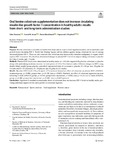Oral bovine colostrum supplementation does not increase circulating insulin-like growth factor-1 concentration in healthy adults: results from short- and long-term administration studies

Date
2019-05-23Author
Subject
Metadata
Show full item recordAbstract
PURPOSE: Bovine colostrum is available in health food shops and as a sports food supplement and is rich in antibodies and growth factors including IGF-1. World Anti-Doping Agency advises athletes against taking colostrum for fear of causing increased plasma IGF-1. There are also concerns that colostrum may theoretically stimulate malignancy in organs which express IGF-1 receptors. We, therefore, determined changes in plasma IGF-1 levels in subjects taking colostrum or placebo for 1 day, 4 weeks, and 12 weeks. METHODS: Plasma IGF1 levels were determined in healthy males (n = 16) who ingested 40 g bovine colostrum or placebo along with undertaking moderate exercise for total period of 4.5 h. Two further studies followed changes in IGF1 using double-blind, parallel group, placebo-controlled, randomized trials of colostrum or placebo (N = 10 per arm, 20 g/day for 4 weeks and N = 25 colostrum, N = 29 placebo arm 20 g/day for 12 weeks). RESULTS: Baseline IGF1 levels 130 ± 36 ng/ml. 4.5 h protocol showed no effect of colostrum on plasma IGF1 (ANOVA, treatment group: p = 0.400, group × time: p = 0.498, time p = 0.602). Similarly, no effect of colostrum ingestion was seen following 4 week (ANOVA, group: p = 0.584, group × time interaction: p = 0.083, time p = 0.243) or 12 week (ANOVA, group: p = 0.400, group × time interaction: p = 0.498, time p = 0.602) protocol. CONCLUSIONS: Ingestion of standard recommended doses of colostrum does not increase IGF-1 levels in healthy adults, providing additional support for the safety profile of colostrum ingestion.
Collections
Publisher
Place of Publication
Journal
Volume
Issue
Pagination
Recommended, similar items
The following license files are associated with this item:

